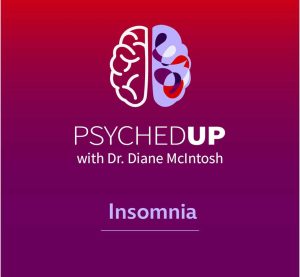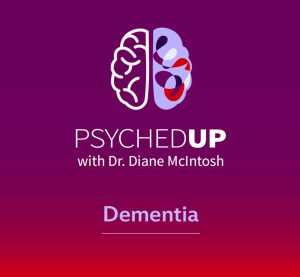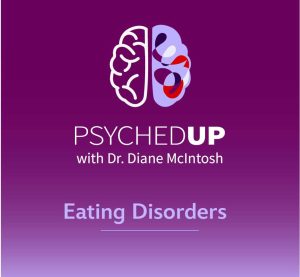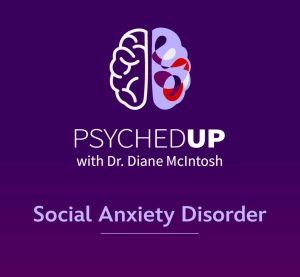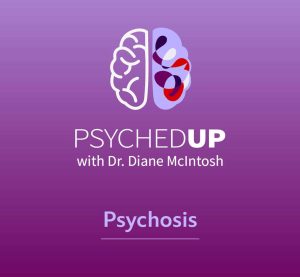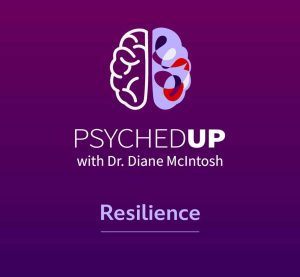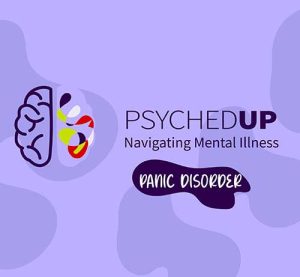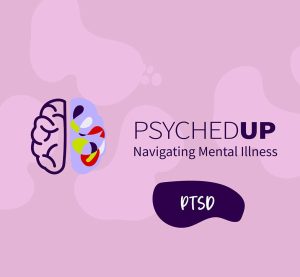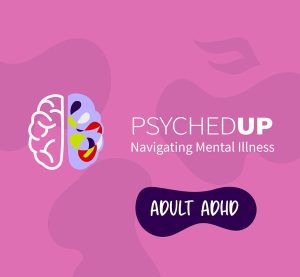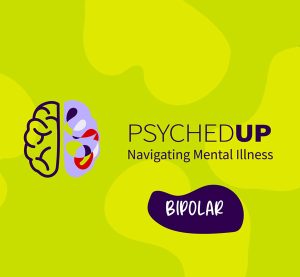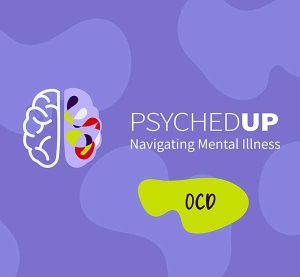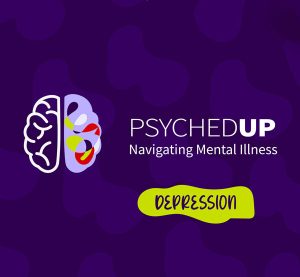
S2 Episode 2: This is Psychosis
Imagine navigating your day while battling voices, visions, and distorted beliefs. This is John’s reality and the starting point for a powerful conversation on psychosis.
In this episode of PSYCHEDUP, Dr. Diane McIntosh explores psychosis through John’s lived experience, highlighting how symptoms such as hallucinations, delusions, and disorganized thinking affect people living with schizophrenia, bipolar disorder, and severe depression. She is joined by Dr. Randy Mackoff to discuss the roles of medication and cognitive-behavioral therapy in managing psychosis, emphasizing the importance of early treatment and support.
Hear John’s story, understand the effects of stigma, and gain practical insights on early intervention, resilience, and family advocacy in mental health treatment.
Listen to This is Psychosis on your favourite platform:
This is Psychosis Podcast Transcript:
DIANE: In this episode, we’re going to talk about psychosis. Unlike other PSYCHEDUP episodes, which have focused on one specific psychiatric disorder, psychosis refers to a group of symptoms, which can be associated with several different disorders. As you’ve heard, they’re really distressing and often quite frightening – for the person who’s experiencing them, as well as for the people who love them.
So let’s dig deeper into what psychosis is, its causes, how the symptoms are diagnosed, and how they’re treated.
As a psychiatrist, I want anyone experiencing any mental illness to be able to hear these stories and know there is a path ahead. My goal is to educate, de-stigmatize and inspire.
I’m Dr Diane McIntosh. Welcome to PSYCHEDUP.
EPISODE INTRO
Schizophrenia, bipolar disorder, depression – these are all distinct mental illnesses, but they can all share a frightening type of symptom, known collectively as psychosis.
Schizophrenia is a psychotic disorder, which means psychotic symptoms are required in order to be diagnosed with schizophrenia. Other psychotic disorders include delusional disorder and schizoaffective disorder.
While not required for the diagnosis, individuals with bipolar 1 disorder may also experience psychotic symptoms, which most often occur during manic episodes or the highs associated with the disorder.
If you want to learn more about bipolar disorder, we have a full episode all about it. You’ll find it on your podcast app.
When depression is severe, some people will experience psychotic symptoms along with the typical symptoms of depression.
This is the case with John and he’s our guest today.
JOHN: I remember in particular, I was in an office working by myself. The door was closed. It was a small office. There was no draft or anything, and, an intense smell of rotting meat instantly became apparent, very intense. And, uh, no amount of wafting or trying to wave it away helped.
DIANE: John was convinced the smell was coming from him.
JOHN: And of course, when something like that happens, um, it seems so real that I would then try to hide what the problem was. So in that case, I was in an office, the window didn’t open, the door was closed, and I was really wondering how I was going to get out of that particular office and down the hallway and past my coworkers with this smell trailing behind me.
So it becomes so real that it, it actually becomes a practical problem of how to deal with it.
DIANE: This is a hallucination – a false sensory experience. Because John is convinced that he can actually smell something, it’s an olfactory hallucination, which are pretty uncommon. Also uncommon are visual hallucinations, which are more often associated with a medical disorder like delirium.
The hallucinations that are most often associated with mental illnesses are auditory hallucinations, hearing a voice or voices that other people can’t hear. Unfortunately, this is another one of John’s symptoms.
In my case, the sounds often came from behind and it would be a sudden, very aggressive, very critical voice calling my name.
“John”
It is exactly the same as having a conversation with a real person, to the point where I would literally snap my head around to see who was standing behind me.
Speaking in the first person, the third person, or even as a running commentary, the voices are really nasty, they’re derogatory, they rarely have anything nice to say.
“You’re an idiot. He is such a bad person. You don’t belong here.”
DIANE: There are several types of psychotic symptoms. John just described hallucinations but there are also delusions.
He experiences both.
JOHN: At the time I didn’t know, uh, that anything was wrong. I thought it was normal for people to believe that others hated them. And that also that life was not worth living.
DIANE: The hatred that John feels, that people actually despise him, this is a delusion. It’s a false, but very strongly held belief. People don’t actually hate John. In fact he’s a very likable person. But his belief is fixed – it’s unrelenting.
DIANE: There are lots of different kinds of delusions. Those most commonly associated with schizophrenia are usually dark and menacing. They’re also called persecutory or paranoid delusions. Someone’s out to get you, wants to harm you.
They’re plotting against you. A common example is the belief that a foreign government is targeting you for assassination.
That’s a pretty unlikely scenario.
Sometimes delusions associated with psychotic disorders are bizarre and completely implausible. Like believing you were kidnapped by Martians and now work for the government of Mars.
DIANE: The delusions associated with depression are usually mood congruent, which means they reflect the sadness, the negativity, associated with depression.
For John, he truly believes people despise him.
For others, delusions associated with depression might include the belief that their internal body parts are rotting or that they’re infested with some kind of bug or worm, or they have a terrible infection or cancer. These are pretty upsetting things to truly believe.
There are other kinds of psychotic symptoms such as being highly disorganized in the way you think or feel or behave. For instance, speaking in a manner that’s incoherent or so tangential that others can’t follow what you’re saying.
And finally, there’s what is called negative symptoms, which means the absence or reduction in normal behaviors or functions such as being completely unmotivated, being unable to start activities or being emotionally flat or without affect.
DIANE: John first started noticing symptoms in his mid-teens.
JOHN: It was constantly there in the sense that it was um, like a soundtrack going through my mind. And it basically occurred morning, noon, and night. It was pervasive, it was persistent, and it was debilitating. If you believe that you are flawed and that people are talking about you and that you smell bad, that doesn’t seem abnormal. It seems reasonable and logical within that context.
DIANE: We’ll be right back with John, but I just wanted to take a second to ask that if any of this sounds familiar to you and perhaps describes someone you know who might be going through something similar, please share this podcast with them and anyone you think might need it. Later in the show, I’m going to get into some treatment options. But if you need information about places to go for help, please go to the show notes. We’ve got resources there. Okay. Back to the show.
——-
DIANE: When John was in his 20s, he was studying in a difficult field at university, preparing for a job he still has today.
This is when he knew something was really wrong.
The voices that he’d been hearing made it really difficult to hide what he was experiencing.
JOHN: It was very critical. Accusatory. The voice was loud. It would, uh, could be male or female. It was always an adult. And it would, uh, ac-ac-accuse me of doing something wrong, and I would have to then debate with the voice, try to justify whatever I had done. So, could be something simple like, you know, maybe I wasn’t paying attention in class, or I dropped a pen or something like that. And you know, this was another manifestation that caused people to look at me askance, and that was that I would talk out loud in response to whatever the accusations were. And so it, it gets the attention of people.
DIANE: It really did.
JOHN: One day, in the summer I bumped into one of the deans of the professional school and he pulled me into his office and picked up the phone and called somebody and said, “I need you to see him immediately.” The next day I was in a psychiatrist’s office and that was when I learned that things were actually wrong with me.
DIANE: What I can tell you is John is a really intelligent person. Yet due to the relentless voices he was failing in school, he was barely functioning. Despite those circumstances, it took some convincing before he finally agreed to go to hospital.
JOHN: I told no one, no family, no friends, nobody. Because I was so ashamed of being in hospital. But, eventually I contacted my parents and, um, let some of my friends from school know where I was.
DIANE: I don’t think I’ve gotten through a whole episode yet without talking about stigma. It’s brutal and such a pointless barrier to people getting the help they need.
JOHN: I’d always been brought up in a family where I was told if you needed a helping hand, you will find one at the end of your arm. You shouldn’t need to go ask for help.
No matter what struggle you’re going through, you should be able to handle it yourself. And so admitting that the problem was bigger than yourself, uh, was completely unacceptable in my world.
DIANE: Getting the correct diagnosis and appropriate treatment, that was a process. John tried various medications and treatments all with varying degrees of success.
Those early years were not easy. His depression and psychotic symptoms disrupted his life. The voices were rarely out of earshot. The horrible rotting smell followed close behind. It was a burden he struggled to live with.
JOHN: I can easily see myself having ended up living on the street if I hadn’t gotten medical care, I was that close to, um, to being unable to function, uh, at least on a, on a long-term basis, if not permanently. It’s one of the reasons why I have so much sympathy for the people who are living on the street.
And I see somebody talking to themselves, I know exactly what’s going on. They’re having a real conversation with a real person in their mind.
DIANE: One of the greatest challenges associated with psychotic symptoms, both for families and for doctors like me, is the loss of insight. Sometimes it’s referred to as anosognosia.
In the context of mental illness, insight refers to an individual’s ability to recognize and accept that they’re truly ill. Lack of insight leads people to avoid seeking treatment or outright refusing treatment. And it’s impossible to force an adult unless by court order to accept treatment if they don’t want it or if they really don’t believe they need it.
JOHN: The problem is intellectually, there are times when I realize that the voices and the smells and the criticism and the thoughts and there are times when I understand that that is not true.
I understand it on an intellectual level, but on an emotional level it is so strong that it overwhelms any rational or logical way of dealing with the situation. You know, it’s funny, human beings, we like to think we’re rational and logical, but, uh, you know, once the emotions take hold. Or once you’ve had those thoughts for so long, then they’re very, very hard to override and maybe to a certain extent, they become real because of your response to them. Um, they become self-fulfilling prophecies.
DIANE: John isn’t our guest’s real name, but nonetheless, he and other people who have shared their stories on this show have put themselves in quite a vulnerable position. They’ve shared stories about themselves they usually don’t, but they all felt it was really important because they want to help others. If you think you know someone who might need to hear this message, please share this podcast with them. You can like and follow it too, to help other people to find us.
The disorders we talk about on this show are incredibly difficult to deal with, but you’re never alone.
Treatment
DIANE: John’s illness was progressing over time, impacting every aspect of his life. He needed proper treatment.
So, let’s get into that and talk about the best ways to treat psychosis.
DIANE: So, as always, I’m here with my friend and colleague, Dr. Randy Mackoff. Randy is a PhD psychologist and an expert in talk therapy, while I, as a psychiatrist, tend to focus on prescribing medications for mental illness.
Randy, it’s so great to have you back in the therapist chair. Do you mind if I lay down?
RANDY: [Laughs] That’s pretty funny Diane, in my office, no one lies down.
DIANE: No? Okay. See we are dispelling myths left, right, and center already. Okay, let’s get to work here.
RANDY: Oh, right.
RANDY: Diane, what are the different medications that are used?
And also do they differ for each type of psychosis that somebody may be experiencing as there can be different causes for the psychosis.
DIANE: When you have psychotic symptoms, they need to be treated with medication, and that medication is called an antipsychotic, but they can be effective for depression. They can be really beneficial for anxiety. They can help to stabilize a mood and they treat psychotic symptoms. So you can be on an antipsychotic and not have psychosis.
Different disorders are often treated somewhat differently. So if you have schizophrenia, that is a psychotic disorder, which means you have to have psychotic symptoms to be diagnosed with schizophrenia, and sometimes you can get away with one treatment, just an anti-psychotic.
But often people who have schizophrenia are on other treatments as well, because just because you have schizophrenia doesn’t mean you can’t also have depression or anxiety or insomnia. And actually it’s very common for people to have what are called comorbid conditions. So you have an antipsychotic, but often other treatments to treat those other disorders.
If you have bipolar disorder, sometimes just an antipsychotic is required, sometimes a mood stabilizer is required. Sometimes a combination of both, but again, very common to have comorbid conditions. When we think about people with depression that have psychotic symptoms, they are pretty much always prescribed both an antidepressant and an antipsychotic. And when you have psychotic depression it’s the most serious kind of depression. So we have to treat with a lot of urgency, because you have a higher risk of suicide, you’ve got a greater risk of harm to others, when you compare it to non-psychotic depression.
So, Randy, as you know, I value talk therapy or psychotherapy. I think we both agree that this is a profoundly important part of treating mental illness, but that talk therapy is not necessarily an effective treatment for psychotic symptoms.
Can you talk about where talk therapy does fit, where it could be of value for patients experiencing psychosis?
RANDY: Most of the attention and has a lot of support is something called cognitive behavioral therapy psychosis, for short, CBTP, and the way to approach psychosis is through a combination of medication and CBT.
DIANE: You’re talking about trying to do CBT with an individual who may not recognize that their delusional thoughts, their false beliefs are actually not true. Or that they’re frightened by their hallucination. So what approach do you take to a patient who lacks insight about their illness, about their psychotic symptoms?
RANDY: When the person does not have insight, in my estimation, talk therapy is not going to be effective. At that stage, what’s going to be most effective is to reduce the anxiety levels and stress levels associated with that by teaching some calming, by teaching some relaxation. And we do know that in a calmer state, the intensity of the psychosis can actually be reduced most definitely. With that said, the symptoms of psychosis with hallucinations and delusions, they do require medication prior to, in my opinion, CBTP.
DIANE: Well think about some of the symptoms of psychosis. Randy, when you’re very disorganized, your thoughts and the way that you speak are so disorganized that people actually can’t follow your thoughts. It’s not difficult. It would be impossible to help someone to organize their thoughts if they were profoundly psychotic.
RANDY: Absolutely. I totally agree with you. At the same time though, is when a person’s experiencing that, often their interaction with friends and family is one that adds to conflict because people are saying, why can’t you understand that what you’re hearing is not real? What you’re thinking is not in touch with reality, and there’s a lot of frustration.
And in that, there’s a denial of the person’s experience and feelings.
DIANE: Yeah.
RANDY: So, for example, if someone is saying, you know, there’s these devices that are reading my mind, these electronic devices and everything, I am thinking everyone is hearing out loud, often the individual who’s experiencing that would be denied that experience.
Now what I’m not suggesting is that one goes along with that. There’s a whole bunch of reasons why one doesn’t go along with that. However, think about what that person’s experiencing. They’re experiencing tremendous amount of fear, loss of privacy, intrusion into their life, and now they’re being told that they’re just outright wrong, as opposed to, “I don’t know much about electronics, however, experiencing that must be really frightening for you and must make you want to hide or make you want to do X, Y, and Z.”
So in essence, by showing empathy, you can create a relationship with the person, and that makes the discussion not to change their belief system, but to bring down the stress, and then building the relationship eventually more open to the benefits of a more structured cognitive behavioral talk therapy approach.
Certainly, medication is absolutely necessary.
RANDY: One other thing is also so that people sometimes feel frightened with their loved ones. Because the symptoms are sometimes extreme that the family member, the caregiver, the loved one becomes frightened themselves either for the wellbeing of their family member or for themselves.
And teaching sort of what are signs of risk to suicide. What are the actions that should be taken, how to reach out for additional help, how to communicate with the healthcare providers. This is all part of what takes place in the talk therapy.
DIANE: Another great segue, Randy, and I’m just making the point that by talking to someone about suicide will not make them suicidal. If someone has an idea about ending their life, you bringing it up is not going to make them more suicidal. In fact, having it out in the open, having that conversation, reduces the likelihood of suicide, not making them more suicidal.
RANDY: And, and I’d just like to add to that Diane something I don’t talk about on this podcast, but I do a lot of work with situations where people who are experiencing psychosis are in crisis. They may be wanting to kill themselves, they may have taken a hostage. There’s a whole variety of things that that I deal with.
As a psychologist, I have huge relief when we get that person to the hospital because I know what’s going to take place. They’re going to be medically looked over. They’re going to be looked over medically, there’s going to be nutrition, there’s going to be some safe housing for a period of time, there’s going to be a social worker who will connect with family. They’ll be under psychiatric treatment, which means medication. There’ll be psychiatric nurses who are helping out as well.
When they are released from the hospital, they are safe and they are much better able to cope with some of the demands of the day and to be able to connect with their loved ones once again.
So the hospital indeed is lifesaving. It is absolutely necessary.
DIANE: And in my experience, Randy, loved ones want to be supportive. They just don’t always know how.
RANDY: Where can you turn your attention as a family member to where you don’t feel entirely powerless? And one is to advocate for your family member, for your loved one. And yes, sometimes advocacy does not go quite to the extent that one would like. It is a way though of exercising some control, is by speaking to the politicians, the MLA, the MPs, speaking to the medical associations, the psychology associations.
DIANE: Becoming a member of the Schizophrenia Society. So I know the BC Schizophrenia Society is a thriving organization, and that way you get both education, but also one of their primary roles is as an advocacy organization. So I know that a lot of members of the board have family members, who have children who had schizophrenia, or they themselves have struggled. So I think you’re absolutely right. That is a place to put some of that frustration is in actually being able to advocate both for your loved one, but for also other people’s loved ones, other people’s family members.
What a beautiful way to end, my dear friend. Thank you, Randy. We really appreciate your insights.
RANDY: Thank you, Diane. I always learn things from you. Thank you.
DIANE: [Laughs] Take care.
SHRINK WRAP
DIANE: We all know there are so many misconceptions and misunderstandings about mental illness, that in every episode I want to share a snippet of something I think you should know. I call it my shrink wrap.
I want to talk about what is a balancing act when my patients who’ve been really ill are now better.
So many of my patients have recovered from a very severe and chronic period of illness. But for the first many months, and sometimes years of wellness, they don’t feel a sense of freedom from illness. That’s because their fear of getting ill again often lingers. They always seem to be looking over their shoulder, wondering whether it will sneak up and strike them again as soon as they let their guard down.
Eventually, most people will start to feel safe again in their wellness. They live their lives without a sense of imminent threat- they’re back to life, they’re back to work, they’re back to love. They feel free.
But with that freedom inevitably seeps in another threat of complacency or fearlessness, or even questioning the severity of the illness they worked so hard to overcome. They think, maybe it wasn’t that bad? Maybe I made a bigger deal of it than I should have? Or even, maybe I don’t need to take my treatment any longer? And so they start to cut back or even stop their treatment.
I want every one of my patients to be free of illness – that’s the goal everyone articulates – I want my life back. I want to feel normal again. I certainly don’t want my patients to live in fear. But, I do want them to respect their illness. It’s real. Losing that healthy respect leads to self-doubt, less adherence with treatment and, too often, illness recurrence.
And John’s been there.
JOHN: I’ve, um, come to the realization that for whatever reason, I’m basically just gonna have to take these medications forever because every time I try not to take them, I relapse.
And it’s not, it, it’s, you know, I don’t know how many more relapses I can go through because it is absolutely awful.
DIANE: And it’s hard to watch. I know how hard my patients work to be well. And setbacks caused by ending treatment, they cause a lot of damage.
But luckily that damage isn’t forever. And psychosis doesn’t need to be either.
John’s struggled through incredible hardship, and let me tell you, he’s one of the most incredible people I’ve met. He just kept trying until he found a treatment that worked for him and he stuck to it.
John has a wife and a career. He loves to get outside, and he’s got hobbies. He has a life worth living – and he didn’t always feel that way.
FINAL WORDS OF ENCOURAGEMENT
JOHN: I would say that everything is under control and that I am as healthy as I have ever been and better able to function at a high level than ever before. And that is due to the treatment that I have received, mainly, and, you know, without wanting to blow my own horn, uh, I’ve put a fair bit of effort into it myself.
There is one caveat that I would give to people. I was told right from the beginning that I would get completely better and that one day I would look back and that all of the events would’ve seemed like a bad dream, but for some of us it just doesn’t completely go away. But that’s okay. I wouldn’t want anybody to get discouraged if they don’t get a 100% cure because even a 95% cure is tremendous improvement.
I would say there is help available and even though it seems that nothing could help, the reality is that there are many things that can be done to make life better. It doesn’t have to be this way.
DIANE: It really doesn’t. There is help out there. If you know anyone who is experiencing psychosis, or you love someone who does, please share this episode with them. And if you think you might have psychotic symptoms, please reach out to your primary care provider and ask for help. We also have extra resources in the show notes. Please take a look and use anything that might help.
And if you like what you heard, please follow and rate the show. It helps other people who might need or want some guidance to find it.
Our producer is Tori Weldon, with sound design and our original theme song written by Mark Angly of Square Wave Sound.
Until next time. I’m Dr Diane McIntosh, thanks for listening to PSYCHEDUP.

